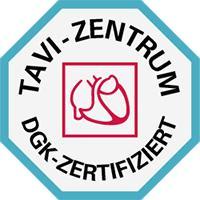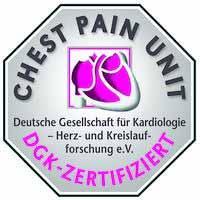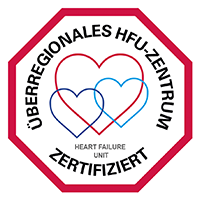Carotid sinus syndrome is a disease characterized by the increase in the degree of sensitivity of the baroreceptors of the carotid sinus to mechanical stimulation. In elderly patients, a reflex decrease in heart rate or relaxation of the soft muscles of the walls of blood vessels causes rapid fainting without preceding symptoms. A mild degree of the lesion is accompanied only by dizziness. The conclusion is made after performing a carotid sinus massage. To reduce the dangerous risk of adverse effects, doctors resort to the use of a comprehensive course of treatment. Therapy may include standard medical care, pharmacological and surgical correction.
Content
- Carotid sinus syndrome overview
- What causes carotid sinus syndrome?
- Symptoms of carotid sinus syndrome
- Treatment in Germany: principles
- Drug treatment
- Pacemaker implantation to treat carotid sinus syndrome
- Why treat carotid sinus syndrome in German hospitals?
- The cost of treatment in Germany
Carotid sinus syndrome overview
Carotid sinus syndrome (CSS) is variously referred to in the medical community as carotid sinus hypertension, or Charcot-Weiss-Baker syndrome. The true extent of CSS is quite problematic to assess, since the manifestations of the abnormality are often limited to fainting. The incidence in the population is up to 40 cases per one million per year. However, scientists say that the mark can reach the highest measure. Neurologists diagnose patients with recurrent fainting episodes less than 1% of the time. The abnormality mainly affects people of retirement age: up to 60% of unexplained cases in patients over 75 years old are caused by an increase in sensitive carotid receptor activity. In terms of gender prevalence, the disease is more frequent in male representatives, with the prevalence rate being 2 or 3 times higher, if we draw an analogy with women.
What causes carotid sinus syndrome?
The carotid reflex is considered to be an important enough part to support a regular blood pressure mark. Baroreceptors receive changes in cavity distension and transmural tension, which transmit impulses to the periphery of the laryngeal region and the vagus nerve.
Changes in vascular distension are detected by baroreceptors. Center-directed impulses are transferred to the carotid sinus, lingual-pharyngeal, and vagus nerve. The heart receives efferent impulses, controlling heart rate.
Functional disruptions of the carotid sinus create an increased response associated with bradycardia or vasodilation, resulting in presyncope, or syncope.
During syncope, mechanical changes in vascular boundaries provoke an overdrive of the reflex response, which subsequently causes hypotension or fainting.
Hemodynamic changes resulting from carotid artery stimulation are not influenced by the changes in physical movement of the body.
Carotid sinus syndrome may be part of a general autonomic disorder associated with autonomic nervous system dysregulation. Neuronal degeneration in the brain has been reported in patients with the syndrome, leading to impaired central regulation of baroreflex responses and predisposing older patients to CSS.
However, the exact mechanism of the syndrome development is unknown. The pathological condition may be caused by changes in the reflex nerve arc or other parts of the body. A potential mechanism for the symptomatology of carotid sinus syndrome may be impaired by autoregulation of the cerebral circulation.
Symptoms of carotid sinus syndrome
The symptoms of the disease are presented in a wide range. Fainting, however, is the most common sign of carotid sinus syndrome. When presyncopal reactions occur before it, patients can anticipate the impending condition. During the presyncopal time, patients with carotid sinus syndrome report:
- The occurrence of shortness of breath.
- Appearance of dizziness.
- Panic attacks.
However, in the elderly, symptoms are minimal or absent altogether. Fainting lasts for no more than a minute, but sometimes does not occur at all. Fainting is accompanied by a change in skin color (pallor), increased sweat production, a slow pulse, and hypotension. The abnormal reaction of a longer period provokes muscle cramps and uncontrolled urination.
At the time of recovery, patients experience mild fatigue and weakness in the body. Additional symptoms include:
- Unstable functioning of the speech apparatus.
- Involuntary crying.
- Loss of normal muscle tone.
- Cognitive impairment (seen in the elderly).
More than 50% of patients who have ever experienced syncope due to carotid sinus syndrome speak of severe bodily injury. The likelihood of a negative phenomenon is increased for younger patients, at a time when the loss of consciousness comes on abruptly and without warning.
Often the disease manifests itself without previously preceding signs, as a result, collecting information from the patient may not give sufficient enough information. The main technique that gives an accurate idea about the pathology involves the massage of the carotid sinus. The clinical technique is prescribed to all patients with fainting without an obvious cause. The procedure is performed in a specific position (lying on the back) with sensors connected to monitor the ECG.
Treatment in Germany: principles
The treatment of carotid sinus syndrome is based on the frequency of symptoms that need to be controlled, their severity, and their consequences for each patient. There is no universal treatment protocol, so in most cases informing the patient about the disease, recommendations regarding the lifestyle changes, and monitoring of the patient’s condition are sufficient.
Some patients with severe and recurrent symptoms that interfere with daily activities may require drug therapy. However, no drug has given long-term efficacy for carotid sinus syndrome in large randomized controlled trials.
The implantation of a permanent pacemaker, on the other hand, is effective for the treatment of cardioinhibitory and mixed types of carotid sinus syndrome.
The medical guidelines classify the implantation of a pacemaker as an indication in patients with carotid sinus stimulation when the drug therapy does not show sufficient effect or in cases of the effective medication for the specific types of the syndrome that can surpass the sinus node and AV conduction. Cardiostimulation is indicated in patients without obvious conditions triggering fainting. Pacemaker implantation is not indicated in patients with carotid sinus syndrome in the absence of symptoms.
Surgical or radiological denervation was previously used to treat the carotid sinus syndrome. However, these procedures are now prohibited because of the increased incidence of complications (hematoma in the surgical area, damage of the mandibular branch of the facial nerve, hypertension crisis after denervation, ischemic stroke, and postoperative arrhythmias, including sinus tachycardia, and atrial fibrillation). The surgical method is highly effective only in patients with neck tumors compressing the carotid sinus or other external causes (scars, etc.) that physically stimulate the area.
Drug treatment
For the treatment of recurrent symptoms of carotid sinus syndrome, therapy with the following medicines is indicated:
- Serotonin reuptake inhibitors (usually sertraline and fluoxetine). The efficacy of these drugs is based on the fact that serotonin inhibits the sympathetic component of the autonomic nervous system, but the exact mechanism of action is still unknown.
- Alpha-1 agonists (mostly midodrine). Midodrine causes spasms of arterial and venous capacitance vessels, has minimal effect on the brain and heart, and reduces the severity of arterial hypotension in CSS.
- The glucocorticoids (fludrocortisone). Fludrocortisone is a sensitizer of adrenergic receptors and a possible synergist of midodrine.
Although many drugs are empirically applied for the prevention of carotid sinus syndrome symptoms, none of them has been proven to be sufficient enough to eliminate the syndrome. In some cases, serotonin reuptake inhibitors have been successfully used, especially in patients with panic attacks.
In clinical studies, it was shown that midodrine significantly decreases symptoms and the severity of carotid sinus syndrome. Midodrine induces arterial and venous capacitance spasm and has minimal effect on the brain and heart. This drug is used for the treatment of symptomatic hypotension.
It should be noted that the problem of carotid sinus syndrome has been most extensively studied in the United States, but the mentioned drugs are not approved by the FDA for the treatment of carotid sinus syndrome.
Pacemaker implantation to treat carotid sinus syndrome
The heart's sinus node works as a pacemaker by default, located in the atrial chamber. It sends out impulses that make the heart contract. In case of disruptions in sinus functioning, the pacemaker takes over the role of the sinus node.
Most pacemakers work exactly when they need to, on-demand. Some pacemakers send pulses continuously, at a fixed frequency.
An electrical cardiac pacemaker is a device used to regulate the heart's contractions through electrical impulses delivered by electrodes. It consists of a special battery and a miniature electronic circuit enclosed together in a hermetically sealed metal case. The electronic circuitry generates short electrical pulses that are conducted into the heart through insulated conductors with electrodes at their ends.
Why treat carotid sinus syndrome in German hospitals?
German cardiologists treat patients from all over the world, for whom heart treatment abroad is almost the only alternative. This is not surprising, since the mortality rate of patients with cardiopathology in German hospitals is less than 3%.
Pediatric and adult cardiology have reached a high level in Germany. Over several decades, this field of German medicine, along with neurosurgery, oncology, and orthopedics, has been developing at an unprecedented rate. Hundreds of scientific discoveries in the diagnosis and treatment of diseases of the cardiovascular system have been made in Germany. The first heart transplantation surgery was performed by German surgeons back in the 1960s. Annually cardiac surgeons perform thousands of surgeries, improving their skills and implementing new technologies and treatment methods. If you have problems with your cardiovascular system, heart treatment in Germany is definitely worth considering.
You can find more information about heart disease treatment in Germany in particular on the Booking Health website. If you need a consultation, leave your information by filling out the request form on our website.
The cost of treatment in Germany
The cost of treatment in Germany, as well as the prices for diagnosis and rehabilitation, are stable. Doctors in German hospitals do not draw up price estimates and invoices; this is handled by specialized departments of the hospitals. With no medical indications for additional examinations or treatment, the patient will not be undergoing them. If during the diagnostics or treatment a need for additional manipulations arises, the patient with carotid sinus syndrome is offered to add them to the program. If further into the treatment, the doctors recommend additional treatment or surgical intervention, a new estimate will be made.
The cost of treatment and diagnostics directly depends on the examinations and manipulations performed. Many hospitals offer ready-to-use diagnostic programs that include a specific set of examinations and tests. The prices for these programs are fixed.
The cost of treatment with pacemaker implantation starts at 3, 791 EUR, and the prices for diagnostics start at 489 EUR.
There is an opinion that it is cheaper to organize treatment in German hospitals by oneself. And in most cases, it is not entirely accurate. Not knowing the specifics of treatment in Germany may cost you way more, than getting help in the treatment organization from a specialized company like Booking Health.
Please leave your request on the Booking Health website to learn more information on how to start your treatment of carotid sinus syndrome in Germany.
Authors: Dr. Nadezhda Ivanisova, Dr. Sergey Pashchenko



















